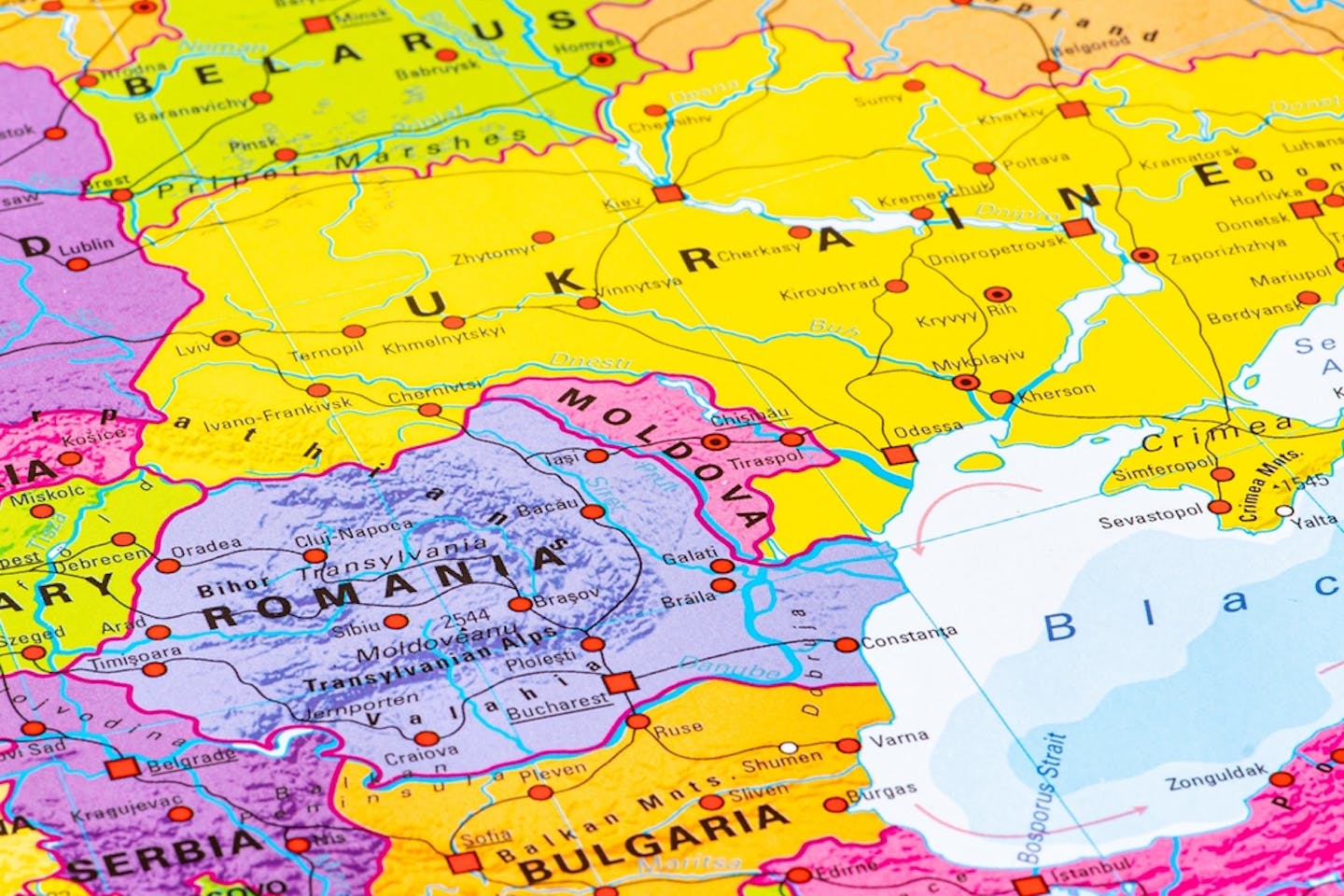Parliamentary elections will be held in Moldova on September 28. While this may seem like a minor event for the rest of Europe, implications for the rest of the continent’s security and stability could be profound.
Moldova plays a vital role in supporting Ukraine. Even though it is among Europe’s poorest countries, it absorbed over 1.5 million Ukrainian refugees at one point during the war and is now home to more than 100,000.
It also helps to ship grain to and from Ukraine through its Danube ports, offering an alternative route and alleviating pressure on Ukraine’s Black Sea routes which are often cut off by Russian blockades.
Should Moldova pivot towards Moscow, Ukraine’s support structure will be weakened, undermining the EU’s eastern resilience. This would increase the risk of military attacks around the EU’s borders, with Romania looking particularly threatened, but increased attacks on Poland and the Baltic states not out of the question.
European leaders signalled awareness of just what could be at risk, with the French president, Emmanuel Macron, along with the chancellor of Germany, Friedrich Merz, and the Polish prime minister, Donald Tusk, travelling to Moldova to talk about unity and commitment to the country at the end of August.
Russia’s president, Vladimir Putin, has previously suggested he planned to occupy the whole of Ukraine, bringing his forces even closer to the rest of Europe. Footage released by Russia’s defence ministry on August 30 suggests a plan to seize Odesa and Kharkiv oblasts, areas along the Black Sea. Meanwhile, a pro-Russian Moldovan government could offer an eastern base for attacks – or even to open a new front. Another factor is that Russia already has around 1,500 troops stationed in Transnistria, a pro-Russian breakaway region of Moldova on the Ukraine border, which demanded independence in 2006, after a ballot that was not recognised by Moldova or the international community.
Read more: Russia has provided fresh evidence of its territorial ambitions in Ukraine
This raises the stakes for the majority of nearby states, many of which are Nato members. Nato members have collective defence commitments under Nato’s article 5, which means they should come to the aid of a fellow Nato member if it were to be attacked.
Moldova’s current state
Moldova’s pro-EU president Maia Sandu currently holds 63 seats in the 101-seat parliament as part of the Party of Action and Solidarity (PAS). Since the party came to office in 2021 it has moved closer to the EU, applying for membership in 2021 after the full-scale invasion of Ukraine. Moldova was awarded candidacy status in June 2022.

In June 2024, accession negotiations were formally opened and, in July 2025, the first EU-Moldova summit was held. The population still broadly supports EU membership, but PAS is projected to vote share, although it is still leading in the polls. This dip in support from an initial 52.8% in the previous parliamentary elections in July 2021 to 25.8% in August 2025 stems from domestic dissatisfaction with [the party] and lack of progress on its policy platform.
In its election campaign PAS promised to fight corruption, make the public sector more efficient, and improve the economy, but they have not made significant progress on any of these plans.
Read more: Why experts expect Russian interference in upcoming election on Ukraine's borders
PAS has presented its progress on EU accession as a key achievement. But without seeing concrete benefits, the electorate has become increasingly alienated from the process.
The PAS government has been in crisis mode for much of its time in power, dealing with a variety of threats created by Russia such as an ongoing energy crisis, raising gas prices and eventually cutting off supplies and a significant loss of exports to Russia and Ukraine has also contributed to a stagnant economy.
So what’s likely to happen?
The most likely election result is that PAS will be forced into a coalition with one or more of the pro-Russian opposition parties, groups that advocate distancing Moldova from Europe. PAS has dominated the pro-EU political space, but the recently established pro-European Alternative Bloc (8.1%) is projected to gain enough votes to overcome the 5% threshold to enter parliament.
While PAS might still gain the most votes, the Patriotic Bloc of Communists, a pro-Russia group led by former president Igor Dodon, is currently expected to be the second-biggest political grouping. This brings together a number of parties including the Party of Socialists, Party of Communists, the Heart of Moldova and Future of Moldova parties. Dodon is currently facing charges of using corrupt practices to control decision making during his presidential term, and allowing state resources to be embezzled on a large scale. The US Treasury also claimed that he was involved in systemic corruption in conjunction with Russia. Court proceedings are ongoing. Dodon denies all charges, and has complained to the European Court of Human Rights that he is facing an unfair trial.
Advancing Russian influence?
Moldova has become a testing ground for Russian cyberattacks and large-scale disinformation campaigns.
It has been a target of Russian political interference. This was evident in the presidential elections and EU referendum in 2024, where attempts at manipulation and foreign influence were widely documented.
Read more: Maia Sandu's victory in second round of Moldovan election show's limits to Moscow's meddling
Similar, if not more, interference from Russia is expected in the upcoming election by the current Moldovan government and the EU.
These 2025 elections come at a decisive moment, not only for Moldova’s future but for the rest of Europe. Other countries need to pay attention to what is happening, and any interference in how the election is carried out.
This article is republished from The Conversation, a nonprofit, independent news organization bringing you facts and trustworthy analysis to help you make sense of our complex world. It was written by: Amy Eaglestone, Leiden University
Read more:
- Why a new ‘iron curtain’ is being built across Europe. This time it’s to keep Russia out
- Russia has provided fresh evidence of its territorial ambitions in Ukraine
- Forcing Zelensky to hand Putin Ukraine’s ‘fortress belt’ in Donetsk will lose it the war
Amy Eaglestone does not work for, consult, own shares in or receive funding from any company or organisation that would benefit from this article, and has disclosed no relevant affiliations beyond their academic appointment.


 The Conversation
The Conversation
 Associated Press US and World News Video
Associated Press US and World News Video Axios
Axios The Babylon Bee
The Babylon Bee Law & Crime
Law & Crime Associated Press Elections
Associated Press Elections The Washington Post
The Washington Post WYFF Politics
WYFF Politics The US Sun Latest
The US Sun Latest The List
The List Raw Story
Raw Story